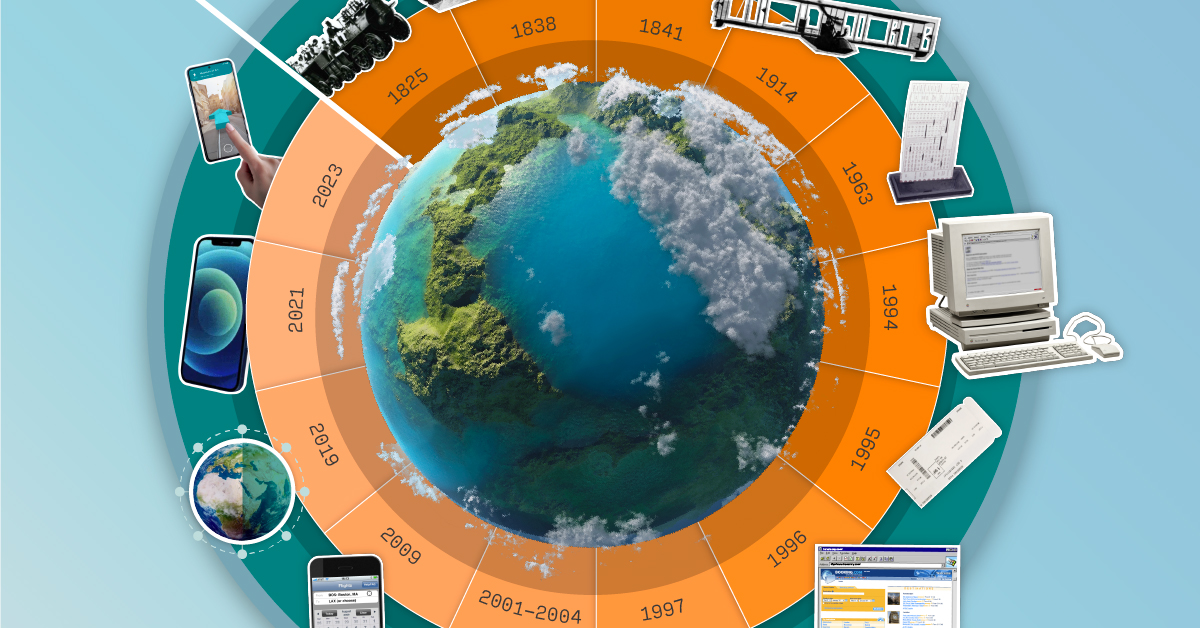How Technology has Democratized U.S. Travel
How Technology has Democratized U.S. Travel
From the Seven Wonders of the World, to the Grand Tour, for most of human history tourism was an elite pastime; it’s only relatively recently that ‘ordinary’ people could travel for pleasure.
In this infographic, we’ve partnered with Booking.com to tell this story and how technology democratized U.S. travel, which according to the World Tourism & Travel Council, could employ 17.4 million people and contribute a whopping $2.2 trillion to GDP during 2023 in the U.S. alone.
A Technological History of Travel & Tourism
The Italian poet F.T. Marinetti declared in 1909 that “the splendor of the world has been enriched by a new beauty: the beauty of speed.” People and goods—but also information—could now move further and faster than ever before, fueled first by steam, then gasoline, and eventually virtually by fiber optic cable and satellite.
In some ways, the old world ended on September 27, 1825, as the very first passenger rail service departed for Darlington, UK, on the 8-mile journey to Stockton on the coast. Passenger steamships soon followed in 1838, then commercial flight in 1914.
| Year | Milestone |
|---|---|
| 1825 | First passenger rail service |
| 1838 | First purpose-built steamship launched |
| 1841 | First package tour |
| 1914 | First commercial passenger flight |
| 1963 | First digital booking system goes online |
| 1994 | First online purchase |
| 1995 | First airline ticket sold online |
| 1996 | Booking.com launched |
| 2000 | Name Your Own Price, first discount site launched |
| 2001-2004 | First travel meta-search sites launched |
| 2009 | First iOS travel app released |
| 2019 | Half of the world's population now online |
| 2021 | Majority of Online Travel Agency bookings made onmobile |
| 2023 | AI begins to assist travelers to plan itineraries |
Meanwhile, the speed of information increased as well. Innovations like the telegraph and telephone, and eventually the internet and smartphone, allowed for real-time communication across previously impossible distances.
Modern Tourism Takes Off
Living standards and leisure time were also on the rise. In 1870, Americans worked an average 3,096 hours per year, but by 2017, that number fell 43% to 1,757 hours. At the same time, U.S. per capita GDP went from $3,007 in 1960, to $76,339 in 2022.
So, with money burning a hole in their proverbial pockets and the time off from work in which to spend it, many Americans took to the air. In 1950, there were 19.3 million airline passengers in the U.S., but in just the first six months of 2023, there were over half a billion.
Create Your Own Adventure
So what do all these changes add up to?
In 1996, Online Travel Agencies arrived on the scene, democratizing travel and connecting intrepid globetrotters with hospitality entrepreneurs worldwide. Thus introducing greater choice, transparency, convenience, and trust into the tourism ecosystem.
A new era of travel had dawned. From basic economics, we know that when demand is better matched to supply, the market expands. It also helps when a consumer can turn a dream vacation into a secured booking with a click of a button, using a trusted platform backed by millions of customer reviews.
When Harry Met Sally and Supply Met Demand
During 2019, this “OTA effect” amounted to 47.5 million additional room nights for American hoteliers and savings of $8 per night for travelers. This is according to a report by Oxford Economics that compared the existing travel market, against an imagined market where Online Travel Agencies didn’t exist; additional room nights and savings are equal to the difference.
Online Travel Agencies also spread out travel away from U.S. tourist hotspots, say New York city or San Francisco. Between 2012 and 2021, growth in room nights in the three least-dense quartiles was higher than the most dense locales. Independent accommodations also saw the greatest increase in demand, while international travelers to the U.S. made the most use of the digital platforms.
For small and mid-sized independent accommodations especially, Online Travel Agencies provide greater visibility and ultimately, profitability. A recent analysis showed that the return on investment of working with an Online Travel Agency was a “net positive,” particularly for smaller properties that are often owned and managed by a sole proprietor.
We the People of the Airport Departures Lounge
Thanks to technological innovations and increased living standards, travel and tourism is now a possibility for millions, if not, billions more people. And not even a global pandemic could dampen demand for long, with International tourism recovering to 84% of pre-pandemic levels in the period January-July 2023.
Today, travelers have access to more and better information, especially through Online Travel Agencies, which deliver tangible benefits for consumers and lodging providers. The result is more choices, greater economic growth, and lower prices for all: a true travel democracy.

Download the free report to learn more about how Online Travel Agencies are impacting the U.S.

-

 Technology20 hours ago
Technology20 hours agoAll of the Grants Given by the U.S. CHIPS Act
Intel, TSMC, and more have received billions in subsidies from the U.S. CHIPS Act in 2024.
-

 Technology3 days ago
Technology3 days agoVisualizing AI Patents by Country
See which countries have been granted the most AI patents each year, from 2012 to 2022.
-

 Brands5 days ago
Brands5 days agoHow Tech Logos Have Evolved Over Time
From complete overhauls to more subtle tweaks, these tech logos have had quite a journey. Featuring: Google, Apple, and more.
-

 Technology2 weeks ago
Technology2 weeks agoRanked: Semiconductor Companies by Industry Revenue Share
Nvidia is coming for Intel’s crown. Samsung is losing ground. AI is transforming the space. We break down revenue for semiconductor companies.
-

 AI3 weeks ago
AI3 weeks agoThe Stock Performance of U.S. Chipmakers So Far in 2024
The Nvidia rocket ship is refusing to slow down, leading the pack of strong stock performance for most major U.S. chipmakers.
-

 Technology3 weeks ago
Technology3 weeks agoRanked: The Most Popular Smartphone Brands in the U.S.
This graphic breaks down America’s most preferred smartphone brands, according to a December 2023 consumer survey.



